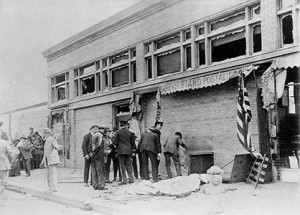On July 22, 1916 a bomb ripped through a huge “Preparedness Day” parade in San Francisco, killing 10 people and injuring dozens. The crime was never investigated. Instead, the bombing was used as an excuse to prosecute activists associated with previous strikes against PG&E and United Railroads.
The Preparedness Day parade was sponsored by the Chamber of Commerce to encourage American intervention in World War I. It was also used to equate the “open shop” with patriotism, and to suggest that union supporters were un-American. The parade’s executive committee included PG&E General Manager John Britton, and the parade’s grand marshal was Thornwell Mullally, the United Railroads’ executive. Both men had previously been confronted with strikes by IBEW Local 151.
Bypassing usual police procedures, the bombing was investigated by District Attorney Charles Fickert and utility detective Martin Swanson. For all practical purposes, these men were agents of United Railroads and PG&E respectively. Based on no evidence whatsoever, they laid charges against Warren Billings and Tom Mooney—two labor activists who had participated in strikes against PG&E and United Railroads. Both men were convicted based on perjured testimony. Billings was sentenced to life imprisonment. Mooney was sentenced to death.
Mooney finally won a full and unconditional pardon from Gov. Culbert Olson in 1939. Billings’ sentence was commuted in 1939, and he was granted a full pardon from Gov. Edmund G. Brown in 1961.
